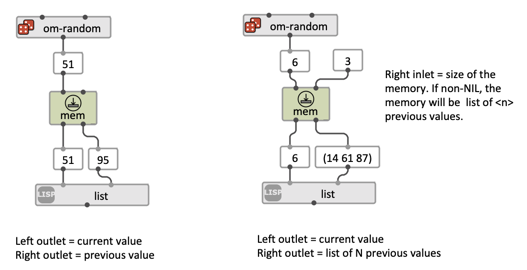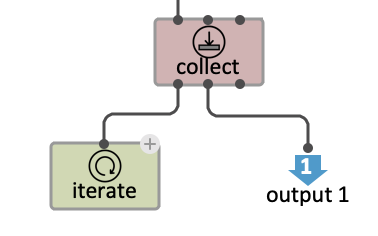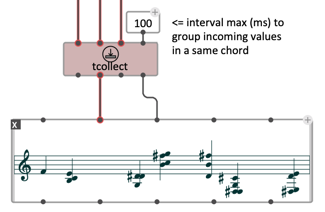OM# Documentation
Memory
OM# visual programs (and functional programs in general) usually don’t deal much with memory. A function should produce no “side effects”, and always behave identically / return the same result from a given set of parameters, regardless of what happens in the meantime, or of what results were computed previously.
This rule breaks very often in practice: for instance as soon as a program preforms a file input or output. In addition, OM# provides various means to record and collect data in visual programs.
The boxes described in this page all embed a storage slot, or memory.
Note: Global variables are another way of dealing with memory and side effects in OM#.
A simple delay: mem
mem is a sort of delay that can be used in patches and iterations to recall the previous value or the n previous values that have passed through the box.

See the
memexamples in OM# inbuilt Help Patches
Collectors: collect, accum, tcollect
collect, accum, and tcollect are advanced collectors inspired by the omloop feature of OpenMusic.
They are meant to be used either inside OM# loops or in reactive programs, as a means to store and collect incoming data.
Remember that these boxes are simply holding the data in memory.
collect

collect is the main collector box, from which are derived the two others.
Its memory is a simple list.
collect has 3 inputs and 3 outputs, which behave slightly differently depending on whether they are evaluated in a standard way (“pulled” from the outputs, typically, in a loop) or activated by a reactive notifier (“pushed” on the inputs).
Standard case (pulling outputs)
- :collect evaluates the :data-in input, collects the value in the memory, returns the collected value.
- :data-out returns the current state of the memory as a list.
- :init (re)initializes the memory with the value of the :init input (default: NIL).
In reactive processes (pushing inputs)
Any collect input receiving a reactive notification simulates the evaluation of the corresponding output:
- :data-in collects the incoming value in the memory.
- :push triggers a notification on the :data-out output holding the current contents of the memory.
- :init triggers re-initialization with the memory with incoming value.
See Reactive processes and the Core features/collect Help Patch
tcollect
tcollect is similar to collect but includes a temporal dimension.
-
An additional :delay input allows setting a delay in milliseconds during which all collected data will be included in a common sub-list.
-
An additional :time-list output returns a list of times corresponding to the collect time of each item in the memory.

tcollectallows for instance the grouping of chords when processing a stream of incoming notes.
See also the Core features/collect Help Patch.
accum
accum is a generalization of collect which performs user-defined collection strategies.
The main difference with collectis the second input, which here must receive an accumulation function able to process a combination of the input (data-in) with the current content of the memory.
Possible functions are for instance +, in order to sum up the inputs (supposedly numbers), max to maximize the values, or any other function or patch processing one input value and the current state of the memory.
accumis mostly intended to be used in loops as a way to extend or specialize the behavior ofcollectwhen needed.
See the Core features/loop Help Patch.

Note:
accumhas no push input and therefore is not suited to work in reactive processes ascollect/tcollectdo.